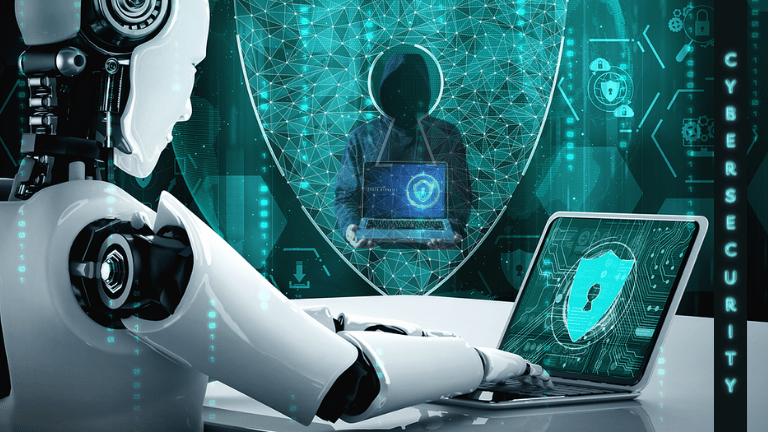Cyber Security
Being ahead of the game is more crucial than ever in the current digital setting, while cyber-security threats are getting more complex. Fortunately, modern developments—especially in the realm of artificial intelligence (AI)—have created a powerful instrument for confronting hackers Artificial Intelligence (AI) is transforming cyber-security by enabling individuals and businesses to reduce vulnerabilities and prevent threats in advance We will examine AI’s impact on cyber security and talk about how it affects maintaining the security of our online environment in the next topic.

The Role of Artificial Intelligence in Cyber Security
In the domain of cyber security, artificial intelligence has shown to be quite creative It helps businesses to more accurately and effectively identify, stop, and handle cyber attacks in real time. The following are some important ways that AI has improved our cyber defenses:
Identification and Avoidance of Threats :
Systems with AI capabilities are excellent at sifting through enormous volumes of data, seeing trends, and spotting abnormalities that human analysts might overlook.AI can filter through huge amounts of data, such as system logs, network traffic logs, and user behavior data, to find potential threats using machine learning techniques. It allows security teams to stop Cyber-attacks before they do a significant amount of harm by working proactively.
Intelligent Access Control and Authentication :
To provide strong security, the conventional username-and password-based authentication techniques are insufficient nowadays. Artificial Intelligence is promoting a revolution in user authentication and access control for sensitive data. . Artificial Intelligence (AI) is able to verify users through using voice Bio-metrics, facial recognition, and behavioral analytics. This implies it hard for unauthorized users to access vital systems and data.
Incident Response System Automated :
To lessen the effects of a Cyber-attack, prompt and efficient incident response is essential. Manual incident response is labor-intensive and prone to mistakes made by humans. The whole incident response process—from discovery to containment and remediation—is streamlined by AI-driven automation. Organizations may assure a quicker and more effective response, hence minimizing possible impact caused by an attack, by utilizing AI-powered solutions.
Intelligence on Predictive Threats :
AI is excellent at anticipating potential assaults in addition to identifying current cyber-threats AI can offer cyber-security teams important information and insights through studying past data and seeing new trends.By putting in place the required security measures ahead of time and reducing the possible impact of future harm, this proactive approach permits firms to keep far ahead of hackers.
The Benefits of Artificial Intelligence in Cyber Security
AI’s setup into safety protocols offers a number of benefits to businesses, individuals, and society at large Here are few of the major benefits:
Enhanced Precision in Detection :
Systems with artificial intelligence (AI) features can spot even the smallest clues of a Cyber-attack, raising the accuracy of detection overall. Security teams may reduce time and resources by focusing their efforts on actual risks by lowering false positives.
Quick Reaction :
Rapid response time is essential in an era where cyber-attacks can occur in just a matter of seconds.AI seems to autonomous reaction mechanisms probable, permitting organizations to react quickly to threats. Any damages can be minimized and recovery activities can get underway quickly by cutting down on reaction time.
Efficiency and Scalability :
Scalability and effectiveness of safety protocols become critical when cyber-attacks continue to change and multiply. Massive data volumes can be handled by AI-powered systems with effectiveness, and they can spot trends and react to dangers at a rate and extent that humans just cannot match. Organizations are able to effectively evolve and react to developing cyber threats thanks to this scalability.
Savings on Costs :
AI-driven cyber security solutions has the potential to save a lot of money once applied. Organizations can improve efficiency in processes and allocate assets by automating routine safety protocols and reducing the need for human intervention. Additionally, significant losses in cash can be averted by reducing the harm that successful cyber-attacks inflict.
The Future of AI in Cyber Security
With artificial intelligence’s constant advancement, its significance in information security will surely grow in the next years. Potential applications of AI where it could have even more of an influence are as follows:
Advanced Malware Identification :
AI will be helpful in discovering and eliminating advanced malware as fraudsters develop more complicated tactics. . AI-powered systems are able to proactively identify and destroy harmful software because they are always developing and adjusting to new threats.
AI-Assisted Threat Detection :
By simplifying the process of searching a network or system for hidden risks, artificial intelligence (AI) can strengthen cyber-security teams. AI can detect and eliminate threats that may have slipped conventional security measures through the use of machine learning algorithms.
Confidentiality and Information Security :
By finding potential flaws in systems and identifying appropriate security measures, AI can support privacy and data protection. Artificial intelligence (AI)-driven solutions are able to identify and stop unwanted access to private data by constantly tracking and evaluating data access trends.
Cooperation and Data Exchange :
AI has an opportunity to help cyber-security experts collaborate and share information more easily. Teams can inspect and exchange threat data in real-time through using AI algorithms, strengthening themselves against cyber-attacks as a unit.
Artificial intelligence integration in cyber security is becoming more crucial than ever as online life gets more complicated and cyber threats are more advanced. Organizations and individuals might stay ahead of the curve by using AI to strengthen their digital ecosystems and protect sensitive data.